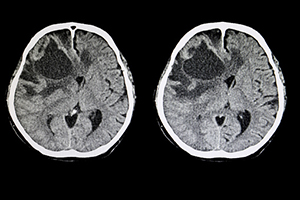In a phase III trial reported in the Journal of Clinical Oncology, Hong et al found that adjuvant whole-brain radiotherapy (WBRT) was not associated with a significant benefit in distant intracranial control vs observation after local treatment of patients with one to three melanoma brain metastases.

Photo credit: Getty
Study Details
In the open-label trial, 215 patients from 24 centers in Australia, the United Kingdom, and Norway who had received local treatment (surgery or stereotactic radiosurgery) for one to three melanoma brain metastases were randomly assigned between April 2009 and September 2017 to receive WBRT (n = 107) or observation (n = 108). The minimum WBRT dose was 30 Gy in 10 fractions.
The primary endpoint was distant intracranial failure within 12 months. Secondary endpoints included time to intracranial failure, survival, and time to deterioration in performance status.
Treatment Outcomes
Median follow-up was 48.1 months. Distant intracranial failure within 12 months was observed in 42.0% of patients in the WBRT group vs 50.5% of the observation group (odds ratio [OR] = 0.71; P = .22); rates over the entire study period were 52.0% vs 57.9% (OR = 0.79; P = .39). Median time to development of distant intracranial failure was 26.4 months vs 11.5 months (P = .20).
Local failure rates within 12 months were 20.0% vs 33.6% (OR = 0.49; P = .03). Median time to local failure was not reached in either group.
Median overall survival was 16.5 months vs 13 months (P = .86), with 12-month rates of 58.4% vs 54.0% (P = .89). Rates of neurologic death incidence were 43.6% vs 45.8% (P = .38). Median time to deterioration in Eastern Cooperative Oncology Group performance status was 3.8 months with WBRT and 4.4 months with observation (P = .32).
KEY POINTS
- WBRT was not associated with a significant reduction in distant intracranial failure within 12 months vs observation.
- No significant difference in overall survival was observed.
Toxicity
WBRT was associated with increased incidence of grade 1 or 2 acute toxicity during the first 2 to 4 months of treatment, including fatigue (68.2% vs 28.1%), anorexia (45.2% vs 8.3%), nausea (33.0% vs 15.7%), dermatitis (11.8% vs 0%), and alopecia (62.4% vs 4.4%). There were no differences in these toxicities by 24 months. No severe adverse events related to WBRT were reported within 90 days of random assignment.
The investigators concluded, “After local treatment of one to three melanoma brain metastases, adjuvant WBRT does not provide clinical benefit in terms of distant intracranial control, survival, or preservation of performance status.”
Angela M. Hong, of the Melanoma Institute Australia, Radiation Oncology, The University of Sydney, is the corresponding author for the Journal of Clinical Oncology article.
Disclosure: The study was funded by grants from Cancer Australia and Cancer Research UK. For full disclosures of the study authors, visit jco.ascopubs.org

